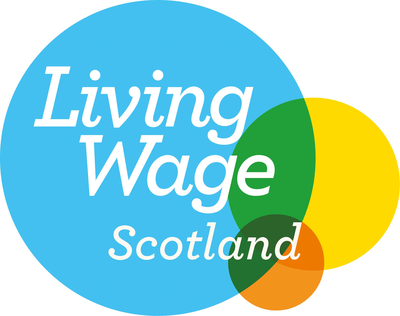We’re delighted to be working with Gail Irvine as our new Living Wage Scotland Manager over the next year to grow the real Living Wage movement across Scotland.
Gail worked as a Senior Policy and Development Officer at Carnegie UK, where she led on the development and delivery of the foundation’s ‘Fulfilling Work’ programme, influencing policy and supporting practical initiatives dedicated to fair work, fair pay, and financial inclusion.
Gail has a passion for fair work, employment policy and employer engagement. We recently caught up with her and asked her to share her experiences and thoughts about the real Living Wage.
Tell us about your role in Living Wage Scotland?
I oversee the development and delivery of the Living Wage programme in Scotland. That includes shaping our strategy, working with our key funders and stakeholders to maximise our impact, and supporting the Living Wage Scotland team to deliver the Living Wage, Living Hours and Making Living Wage Places campaigns.
Why do you think the real Living Wage is more important than ever?
We have already seen a lost decade of real pay growth for many people, a pandemic that disproportionately impacted lower-earners, and now we face a cost-of-living crisis. While we have made a lot of progress in growing the Living Wage movement in Scotland, too many people are still trapped in low pay and struggling to keep their heads above water. The Living Wage is important because, unlike the minimum wage, it offers a wage floor that is connected to the real cost of living. For employers, going above the statutory minimum to pay the Living Wage allows them to distinguish themselves in a tight labour market; and to reap the business benefits of a more motivated, loyal workforce.
Why do you think committing to the real Living Wage is important to Scotland as a whole?
The Living Wage is a crucial part of tackling in-work poverty and enabling people to afford a minimum essential standard of living. It’s important economically, as increasing the money in people’s pockets also helps to sustain local businesses because people have more to spend on consumption and leisure. So, it’s important in material terms, but also in terms of demonstrating fairness and dignity – that people’s contribution is valued, and that they have the right to expect a fair day’s wage for a hard day’s work.
What do you think are the barriers that must be overcome to see more workers in Scotland paid the real Living Wage?
I think one of the barriers is changing business models. Business models in some industries have been based on paying most of their staff on or near the minimum wage. It takes time to demonstrate that alternative business models – based around the real Living Wage and other fair work practices – are not only commercially sustainable, but actually produce better outcomes for both workers and business. Luckily, we now have Living Wage trailblazers in most industries to demonstrate the benefits of being a Living Wage employer. And the more Living Wage employers there are, the greater the social expectation that workers should receive at least a real Living Wage, helping keep up the momentum of the campaign.
What’s been getting you through the pandemic?
Fulfilling work, exercise, staycationing and loved ones.
What are you hoping for in 2022?
My role is a maternity cover post. So, while I’m here, I’m hoping to make the most of my time, make a difference, and play my part in helping ensure the Living Wage campaign continues to go from strength to strength!
